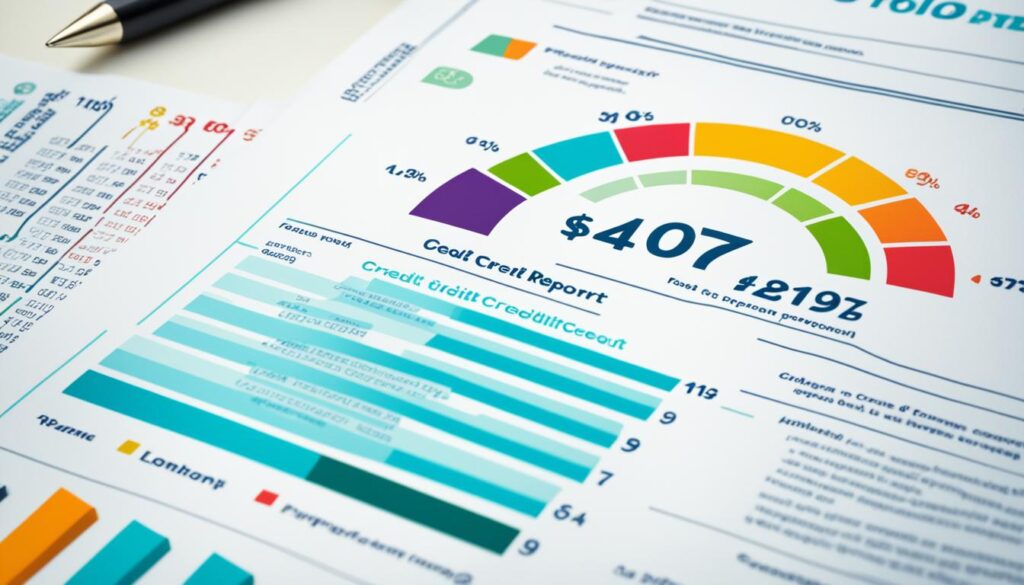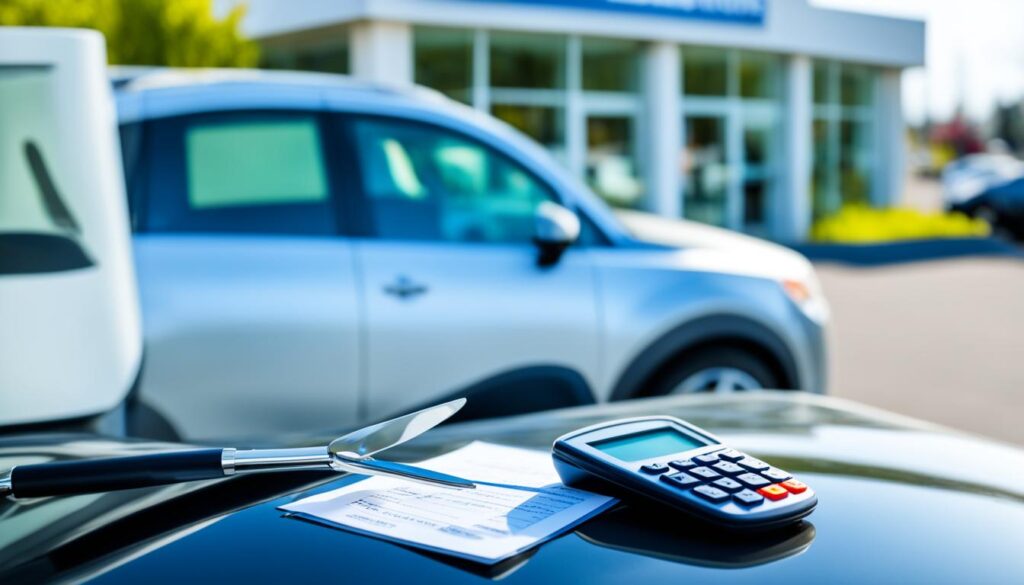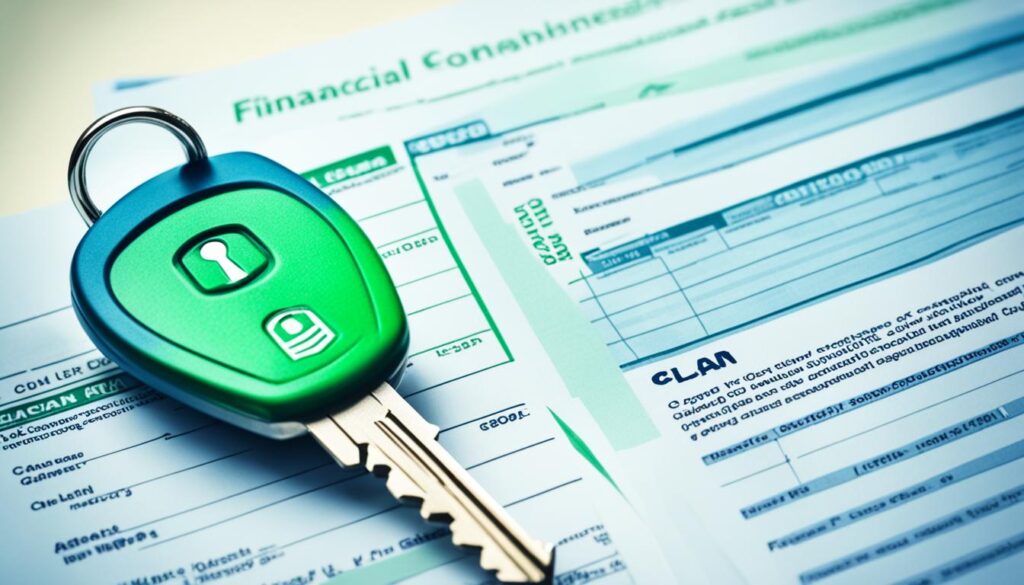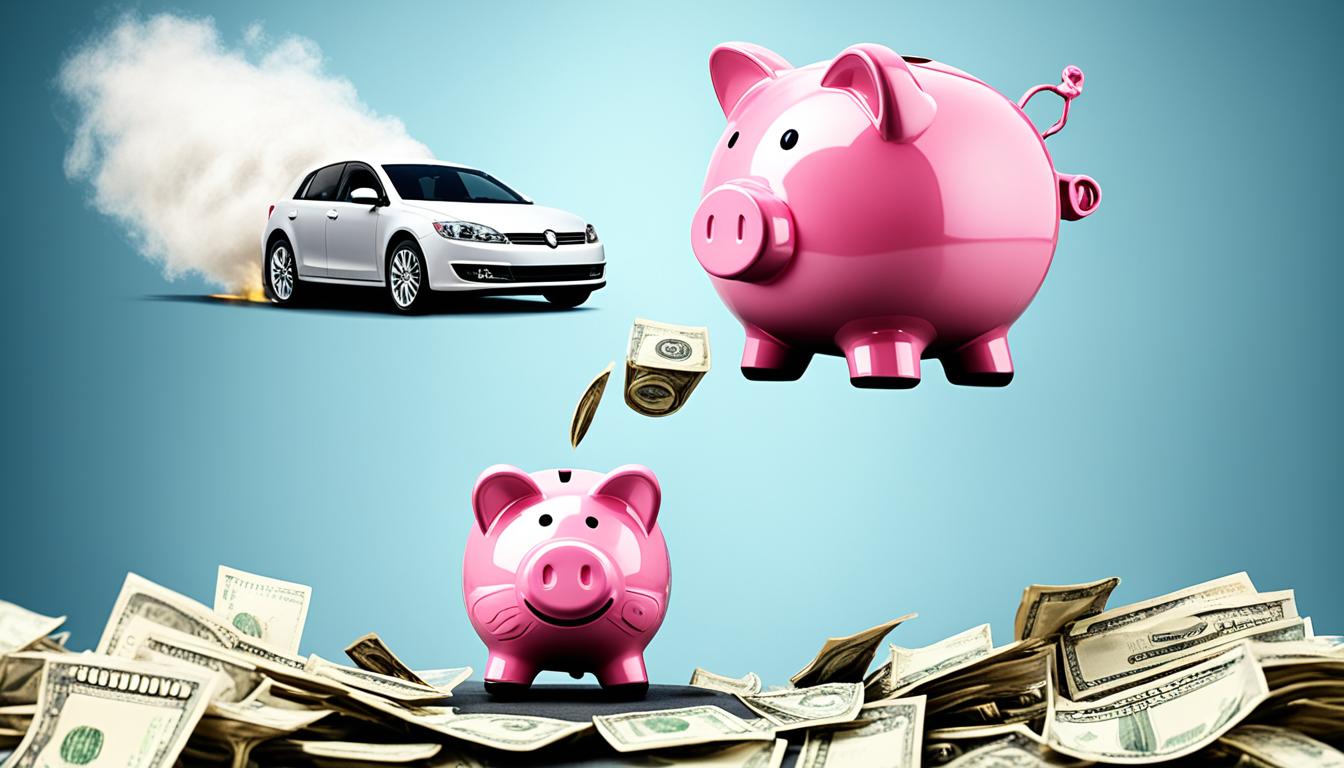Car Loan: Buying a car is a big step, especially for first-timers. The guide here will help you find the best car loan options in the US. It’s designed to give you the key details you need.
This guide covers everything from first-timers’ loans to how to boost your chances of getting approved. We will also go over how to find a car loan that fits your budget. Plus, you’ll learn about top lenders and how to get the best interest rate.
Key Takeaways: Car Loan
- Familiarize yourself with first-time car buyer loan options, including credit unions, captive lenders, and online marketplaces.
- Take steps to improve your chances of loan approval, such as reviewing your credit report, knowing your credit score, and considering a co-signer.
- Determine an affordable monthly payment by calculating your budget and factoring in additional car expenses.
- Get preapproved for a loan before shopping to leverage the best interest rate and stay within your budget.
- Research the right vehicle for your needs, weighing factors like fuel efficiency, safety ratings, and reliability.
Understanding First-Time Car Buyer Loans
First-time car buyers often find financing challenging. They lack credit history and haven’t dealt with auto loans before. This is true regardless of their age. They might be recent grads, young adults, or people just moving to the U.S.
But, there’s good news. Some lenders target first-time car buyers’ needs. These include credit unions, captive lenders (car manufacturers’ financing arms), marketplace lenders, and online car retailers. They offer special financing for those new to buying cars.
Compared to big banks, these lenders have easier credit rules. This helps first-time car buyers get the money they need. It means those just starting with credit can get support. They can learn about their choices and start their car-buying process confidently.
Also Read : Undergraduate Scholarship: How Do You Prepare For Scholarship?
| Lender Type | Advantages for First-Time Car Buyers |
|---|---|
| Credit Union | Typically offer more lenient credit requirements and personalized service for new to credit borrowers. |
| Captive Lender | May provide in-house financing options and incentives through the automaker’s financing arm. |
| Marketplace Lender | Online platforms that connect first-time car buyers with multiple lenders, allowing for comparison of rates and terms. |
| Online Car Retailer | Offer streamlined financing options, often with the convenience of an end-to-end digital car-buying experience. |
Learning about the lenders focusing on first-time car buyers helps future car owners. They can pick a financing plan that suits their budget and situation. This way, they can plan their vehicle purchase wisely.
Also Read : How Can I Apply Scholarships For MCA?
Improving Your Chances of Loan Approval

Being a first-time car buyer, it’s key to boost your likelihood of getting a loan. Start by checking your credit report carefully. Know your credit score too. It’s also wise to look at different loan offers. Think about adding a co-signer or co-borrower. This boosts your chances, especially if your credit is not perfect.
Also Read : Emergency Loans: How Can You Get Quick Financial Assistance?
Review Your Credit Report
Begin by scanning your credit report for errors. Any mistakes could hurt your credit score. If there are any, work with the credit bureaus to fix them. Getting rid of these errors can make your credit look better. This could help you get a loan with better terms.
Know Your Credit Score
Understanding your credit score is very important. It shows lenders how likely you are to repay a loan. By knowing your score and what affects it, you can work towards improving it. This could make it easier to get a good loan rate.
Compare Lenders and Shop Around
Don’t rush to pick the first lender you find. Look at what various lenders, including credit unions and online places, offer. Comparing rates and terms can save you a lot of money.
Look for Rate-Reduction Features
Some lenders provide ways to lower your interest rate. For example, they might lower your rate if you pay on time or if you set up automatic payments. A bigger down payment might also help. Don’t forget to check if any of these options are available to you. They might just sweeten the deal.
Also Read : Business Loans For Startups: What Are The Best Options Available?
Consider a Co-Signer or Co-Borrower
Having someone co-sign or borrow with you can be the boost you need. This is especially true if your credit history is short or not the best. A co-signer with good credit can help you get approved. They might even help you get a lower interest rate. It’s a smart move for those with little credit history.
Determining an Affordable Car Loan

For first-time buyers, it’s key to find a car loan that won’t break the bank. Start by setting a monthly budget for your car expenses. You should spend under 10% of your take-home pay on the car payment.
Additionally, never go over 15-20% for all car costs, which covers depreciation, interest, fuel, insurance, maintenance, and fees.
Also Read : Secured Loan: What Are The Steps To Apply?
Calculating a Realistic Car Payment
When figuring out your car payment, start by looking at your net income. Remember to include other monthly expenses like rent and bills. Knowing your total monthly budget helps set the right amount for your car payment.
Factoring in Additional Car Expenses
Don’t forget, the car payment is just a part of owning a car. You also need to budget for fuel, insurance, maintenance, and fees. These costs can change how much you can spend on a car each month.
| Expense | Average Monthly Cost |
|---|---|
| Depreciation | $200 – $500 |
| Fuel | $100 – $300 |
| Insurance | $100 – $300 |
| Maintenance | $50 – $150 |
| Fees | $20 – $100 |
Car Loan: Obtaining Preapproval and Shopping for Rates

Getting preapproved for a car loan before shopping can change the game, especially for first-time buyers. This step helps them stick to their budget. Plus, it gives them a rate to try to beat when at the dealership. With preapproval, buyers can be in a better position to negotiate. They can aim for the best loan terms possible.
Benefits of Getting Preapproved
Preapproval offers many upsides for new car buyers. It tells them the exact loan amount and interest rate they can get. So they know which cars are affordable for them. Besides, a preapproval letter shows dealers that the buyer is ready and trustworthy. This might lead to a better interest rate and loan terms.
Steps to Get Preapproved
The process starts with a lender checking the borrower’s credit score, history, and income. This check sometimes lowers the buyer’s credit score a bit. But, the benefits are usually better. First-timers should look at different offers, gather their documents, and apply to several lenders.
Refinancing Options for Higher Rates
If a new buyer gets a high interest rate, they can turn things around later. After paying on time for 6-12 months, they should look at refinancing. Refinancing could get them a lower interest rate and better loan terms. This might save them money and make their finances smoother.
Researching the Right Car for Your Needs

Before you buy a new car or a used car, it’s important to look into what suits you. First, think about what you need and what you can afford. Check out fuel economy, safety ratings, insurance costs, and reliability.
Considerations for New vs. Used Cars
Choosing between a new car and a used car changes how much you’ll spend now and later. New cars have the latest tech and features. But, they cost more to insure and lose value quickly. Used cars, on the other hand, could be easier on your wallet. They might not have the newest safety or entertainment tech though.
Evaluating Vehicle Options
Take time to look at different car types. Read online reviews and chat with other car owners to learn more. Think about how much space you need, how many people the car should carry, and what kind of performance is important to you.
Comparing Car Prices and Costs
It’s smart to compare prices from different sellers, like dealerships, online retailers, and private party sales. Think about more than just the car’s price. Consider insurance costs, fuel efficiency, and what repairs might cost over time.
| Feature | New Car | Used Car |
|---|---|---|
| Fuel Economy | Newer models typically have better fuel efficiency. | Older models may have lower fuel economy, but can be improved with regular maintenance. |
| Safety Ratings | Newer cars often have the latest safety technologies and higher safety ratings. | Depending on the age and model, used cars may have lower safety ratings compared to newer vehicles. |
| Insurance Costs | New cars typically have higher insurance premiums due to their higher value. | Used cars generally have lower insurance costs, as the vehicle’s value has depreciated. |
| Reliability | Newer models often have fewer reported issues and better reliability ratings. | The reliability of a used car can vary depending on the vehicle’s history and maintenance record. |
| Pricing | New cars have a higher sticker price but can be negotiated. | Used cars have a lower initial cost, but the price may still be negotiable. |
Navigating the Car Buying Process
First-time car buyers need to be ready before visiting a dealership. Knowing their top monthly payment and any preapproved loan offers is key. This info will help them make a smart choice when buying a car.
Preparing for the Dealership Experience
It’s better for new buyers to talk about the out-the-door price rather than just the monthly cost at first. This makes sure they know the car’s total cost, with any add-ons or fees. Sharing preapproved loan terms with the seller might help get a better deal too.
Negotiating the Out-the-Door Price
New buyers should watch out for “yo-yo financing.” This is when the dealer might try to change the deal after the car’s been taken home. Using a preapproved loan can help avoid this. They should check all the sales papers to be sure they follow the Truth in Lending Act.
Avoiding Yo-Yo Financing
Being well-informed and proactive is crucial for first-time buyers. It helps them tackle the car buying process with confidence. They can get good financing terms and drive off in their dream car.
Top Lenders for First-Time Car Buyers

Financing a first car? Several lenders provide great options for new buyers with little credit history. AUTOPAY, Chase Auto, and Navy Federal Credit Union are among the top picks. So are Carvana and CarMax.
AUTOPAY
AUTOPAY helps first-time buyers find loans online. Their platform lets you compare different offers. This means finding the best rates, even with a not-so-great credit score. They’re great for those looking to buy their first car.
Chase Auto
Chase Auto, part of a big U.S. bank, offers many loan types for first-time buyers. They have good interest rates and a simple online application. This can make the car buying process smoother and easier.
Navy Federal Credit Union
Navy Federal serves the military, veterans, and their families. It often gives better terms to these groups. Their easy application and great customer service make buying a car simple.
Carvana
Carvana is known for selling cars online. They offer easy financing and a big selection of used cars. First-time buyers appreciate their simple process and good loan deals.
CarMax
CarMax is a top seller of used cars. It also offers financing to new car buyers. Their focus on customer needs means they may offer more flexible loans. This can help first-time buyers get a smoother deal.
AUTOPAY, Chase Auto, Navy Federal Credit Union, Carvana, and CarMax all offer many ways to finance your first car. First-time buyers should loan calculator check them out to find auto loan calculator the best loan for their loan payment needs.
Car Loan: Factors that Affect Interest Rates
When you’re getting a car loan for the first time, it’s important to know several dealerships annual percentage rate factors. These factors influence the interest rate monthly payment you’ll get. Learning car buying about them will purchase price help you get better annual loan payment percentage rate loan terms.
Credit Score and Credit History
If you have a high credit score and a good credit history, you usually get a lower purchase price purchase price interest rate. Lenders see you as less risky. So, they give you better loan terms.
Loan Amount and Term Length
The size of your loan and how long you’ll take to pay it back also affect the interest auto refinance rate. Smaller loans and shorter payback times mean less risk for the lender. This auto refinance leads to lower Interest rates. But if your loan is big or you take a while to pay it off, your interest rate goes up.
Down Payment and LTV Ratio
Making a bigger down payment can lower your interest rate too. It lowers the LTV ratio. A lower ratio means less risk for the lender. Plus, it shows subject to change subject to change you’re invested subject to change in the new and used loan too.
| Factor | Impact on Interest Rate |
|---|---|
| Higher Credit Score and Positive Credit History | Lower Interest Rate |
| Smaller Loan Amount and Shorter Loan Term | Lower Interest Rate |
| Larger Down Payment and Lower LTV Ratio | Lower Interest Rate |
Understanding these factors is key for first-time car buyers. It helps you make smart auto loan calculator choices and negotiate better terms. This way, you can get a loan that fits your financial goals.
Also Read: Smart Money Moves: Strategies For Student Loan Repayment Success
Conclusion
First-time car buyers, you have many ways to finance your purchase. Options range from credit unions to online shops like AUTOPAY and Carvana. The car loan process might be tricky, especially for those with little credit history.
There are steps to boost your loan approval chances. Check your credit report and score. It’s also smart to get preapproved.
Knowing what monthly payment you can manage is key. This helps find the right vehicle for you. Remember, choose a car that fits both your needs and budget.
Learning about interest rates is crucial. Your credit score, the loan amount, and the down payment all play a role. This knowledge can help you get the best loan deal.
With the right moves, first-time car buyers can enter the market with confidence. Do your homework. Make smart, informed choices. This way, you can enjoy owning a car without stressing about the finance part.
FAQs
Q: What factors should I consider when applying for a car loan as a first time buyer?
A: When applying for a car loan as a first time buyer, consider your credit score, income stability, down payment amount, loan term, interest rate, and total loan amount.
Q: How can I estimate my monthly car loan payment?
A: You can use an online loan calculator to estimate your monthly car loan payment based on the loan amount, interest rate, and loan term.
Q: Is it better to buy a new or used car with a car loan?
A: Whether to buy a new or used car with a car loan depends on your budget, preferences, and priorities. New cars offer the latest features but come with higher prices, while used cars are more affordable but may have higher maintenance costs.
Q: How do I apply for an auto loan?
A: You can apply for an auto loan through banks, credit unions, online lenders, or car dealerships. Make sure to have your financial information, such as income and credit history, ready for the application process.
Q: What is the difference between APR and interest rate on a car loan?
A: APR (Annual Percentage Rate) includes the interest rate and any additional fees or costs associated with the loan, while the interest rate only represents the cost of borrowing the principal loan amount.
Q: Can I refinance my car loan to get a better rate?
A: Yes, you can refinance your car loan to potentially get a better interest rate, lower monthly payments, or change your loan term. Be sure to compare offers from different lenders before refinancing.
Q: How does leasing a car differ from getting a car loan?
A: Leasing a car involves renting a vehicle for a set period with monthly payments, while getting a car loan means borrowing money to purchase the vehicle with the intention of owning it once the loan is paid off.
Source Links
- https://www.investopedia.com/best-car-loans-for-first-time-buyers-7373461
- https://www.nerdwallet.com/l/first-time-car-buyer
- https://www.nerdwallet.com/best/loans/auto-loans/first-time-car-buyer-loan

